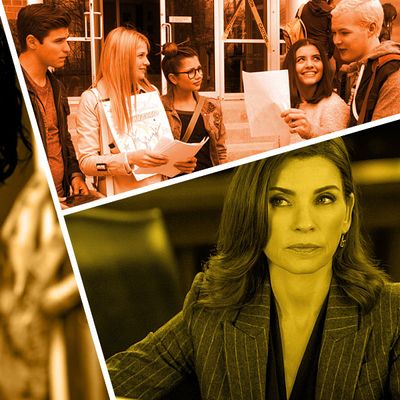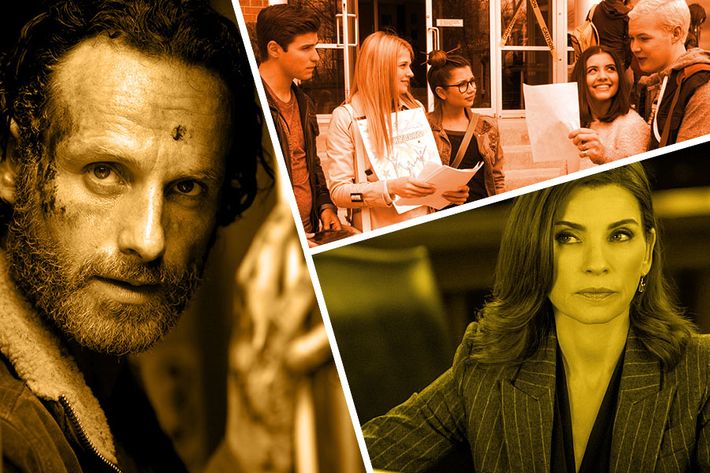

Welcome back to Stay Tuned, Vulture’s TV advice column. Each Wednesday, Margaret Lyons answers your questions about your various TV triumphs and woes. Need help? Have a theory? Want a recommendation? Submit a question! You can email [email protected], leave a comment, or tweet @margeincharge with the hashtag #staytuned.
The Walking Dead: Why? —@andytgerm
I bailed on The Walking Dead halfway through season three because I thought the writing was pretty crap. Am I a grouch that’s not willing to give this show a chance? How does this show do numbers like that when good shows struggle? And doesn’t the fact that so many people are watching only make it more likely that the show will stay in its zombie-skull-smashing lane? Or am I just a hater and this show isn’t as bad as I remember it being? I will give this show a chance if you tell me it deserves one. —Tyler
I cannot explain the popularity of The Walking Dead. I don’t get it at all. I guess it’s the only zombie show around? I am pro unusual premises, pro ensemble shows, pro shows that have badass female characters, pro shows that employ improv comedians in serious roles. (Holla, Steven Yeun.) But TWD drives me crazy.
The series has an amazing setup (and, I am happy to grant, a fantastic pilot), and yet it relies on its characters Gilligan’s Island–ing everything rather than having any good ideas. We have this totally secure prison set up — but ruh-roh, someone ran over it with a tank! The flashbacks tell us nothing. And the show could not possibly have less to say. Not everything is going to be Mad Men, but it would be nice to have some central thematic ideas: Are people ultimately good? Does humanity crave society? What is the difference between consciousness and sentience? Is the show claiming that, given the downfall of civil society, all ordinary people become extraordinarily violent, or have we only met extraordinary people? I’m fine with moral ambiguity — I crave it! More ambiguity for Marge, please! — but TWD’s characters all seem to have the same “I’m not who I used to be … now toss me that gun” ethical compass.
If you like it, you like it, and I’m someone who voluntarily watched every episode of Smash, so believe me when I say I’m not judging. But if you tried it and it wasn’t for you, don’t feel compelled to take another look.
I get overwhelmed with the logistics of finding the shows I want to try. I have a limited TV-time budget, and sometimes the task of checking various platforms for what’s available deters me from branching out. I have cable, HBO, Netflix, and Amazon Prime. What are your tips for figuring out when and where a show is available (and if it can be had for free)? Are there any shortcuts? —Georgia
This is a major source of frustration for me, too, especially when trying to track down older, obscure, or international shows. I mourn the loss of Clicker.com, which CBS bought and shut down for what appears to be no reason. (Money? Why else would companies do things? I don’t know.) Other people like Can I Stream It?, although I do not care for it — the interface is terrible for TV shows, and the information is often incorrect. I’m having okay luck right now with Watchily; MoreFlicks works pretty well, too, and you can specify U.S./U.K./Canada, which matters to some Stay Tuned readers. But these won’t search your cable provider’s on-demand options, which often have recent episodes of current TV shows. (In the meantime, here’s what’s new on Netflix this month.) If some intrepid reader wants to craft the holy grail of streaming-directive sites, we will all be extremely grateful.
I watched the first season of The Good Wife and then I had to stop. I work as an attorney at a large law firm, and the way they practice law on the show is just so incredibly unrealistic — Alicia is a specialist in every type of law! Cases go to trial four days after they get the client! I love TV, and believe me, I know that TV shows are entertainment and that lots of shows misrepresent careers. I also know from personal experience that what Alicia would actually be doing at a law firm would not be entertaining television. But The Good Wife is a critically acclaimed prestige drama centered on law firms, and it gives the impression that its supposed to be basically realistic while totally misrepresenting a career.
Even if its entertaining, can you reconcile judging a show that basically purports to be realistic as great when it is totally unrealistic? (As you might be able to tell from my question, I can’t.) —Katie
I asked my dad, who is a lawyer, how he approached this same problem, and this is what he told me: “TV lawyer shows (like cop shows and doctor shows and military shows) are not documentaries. (Except for Alaska State Troopers, which I love.)” Have you tried Alaska State Troopers? My dad loves it.
I don’t think The Good Wife purports to be realistic about the practice of law, though, any more than in purports to be realistic about being set in Chicago when you can see the Empire State Building in the background and there are yellow cabs everywhere. It’s not that I don’t share your frustration — watching people with spaghetti arms do CPR on TV makes me want to cry into 10,000 Red Cross certifications — it’s just that so little of my enjoyment of shows relies on their ostensible veracity. Everyone just walks around no problem on spaceships on sci-fi shows. (Don’t get me started on the whoosh-whoosh noises from space, where there is no goddamn sound, because sound is a wave that moves through air, and there’s no — ugghghh.) In real life, women are often topless while in bed with their sexual partners. Judges never bang their gavels, Scotland does not have time travel, so far there are no real zombies in the Atlanta area, and some of the losers on Project Runway show at Fashion Week as decoys.
Are there real emotions? Do people have coherent points of view — not ones you agree with or ones that are good necessarily, but consistent ones, at least? Do all the characters seem like they’re in the same world? Does it seem like the characters do things when they’re not onscreen? Do different characters have different voices, or do they all sound like variations on one writer? Does anyone make jokes? (Go ahead, try to remember the last day you had where not a single person made a single joke.) Are there natural causes and effects? Outside of documentaries and news programming, I don’t need my shows to be true, I just need them to feel true.
In the past, there were tons of shows about teenagers in high school that showed them actually going to class, dealing with teachers, doing homework, and working on group projects as major story lines. For example, there was City Guys, Hang Time, Saved by the Bell, Gilmore Girls, and Boy Meets World. Are there any shows on the air currently that have high schoolers in high school? —AG
Degrassi! You seek Degrassi (sometimes known as Degrassi: The Next Generation). The show returns for its 14th season at the end of October, but there’s no real need to catch up on the previous hundreds of episodes. Switched at Birth’s characters just graduated from high school (always dangerous on a teen show!), but the previous seasons had plenty of in-school issues. Pretty Little Liars, Faking It, and Awkward. deal with classroom issues every once in a while, too, but are mostly focused on boning.

